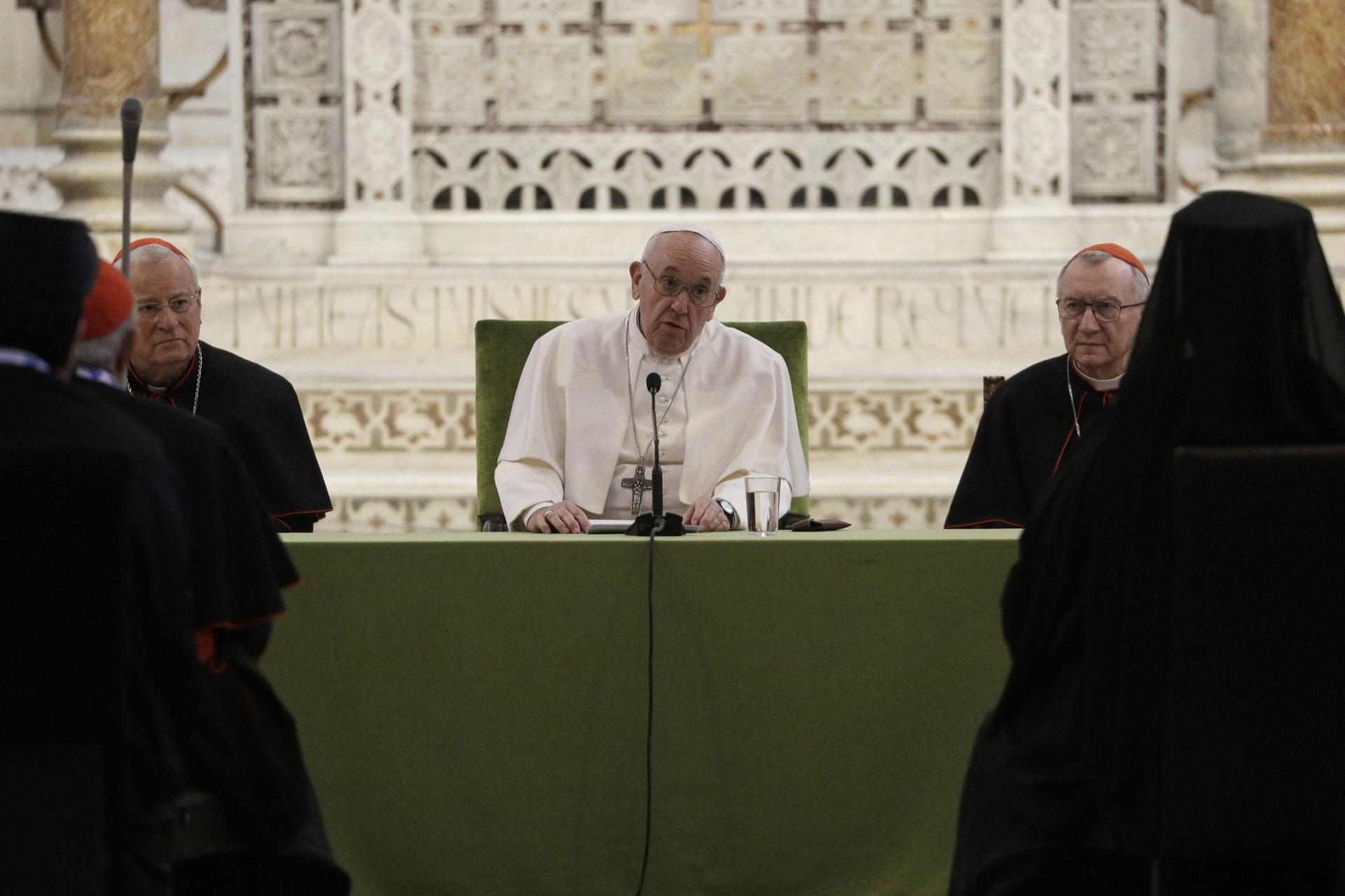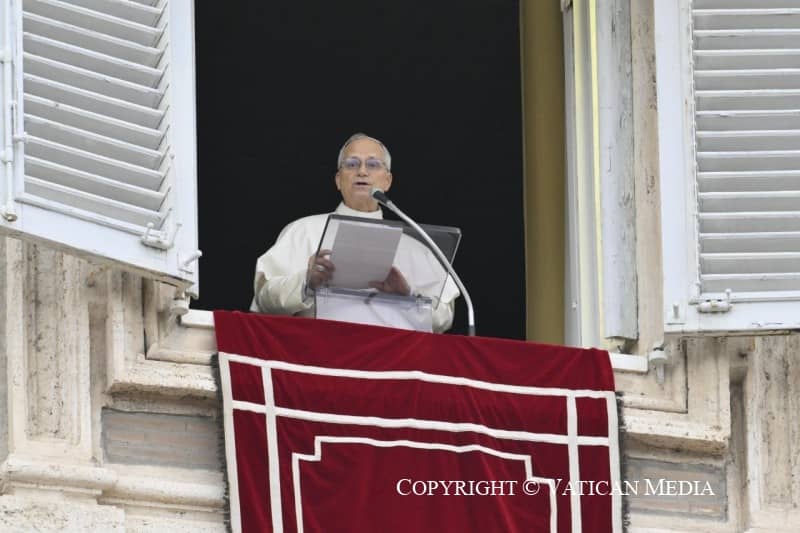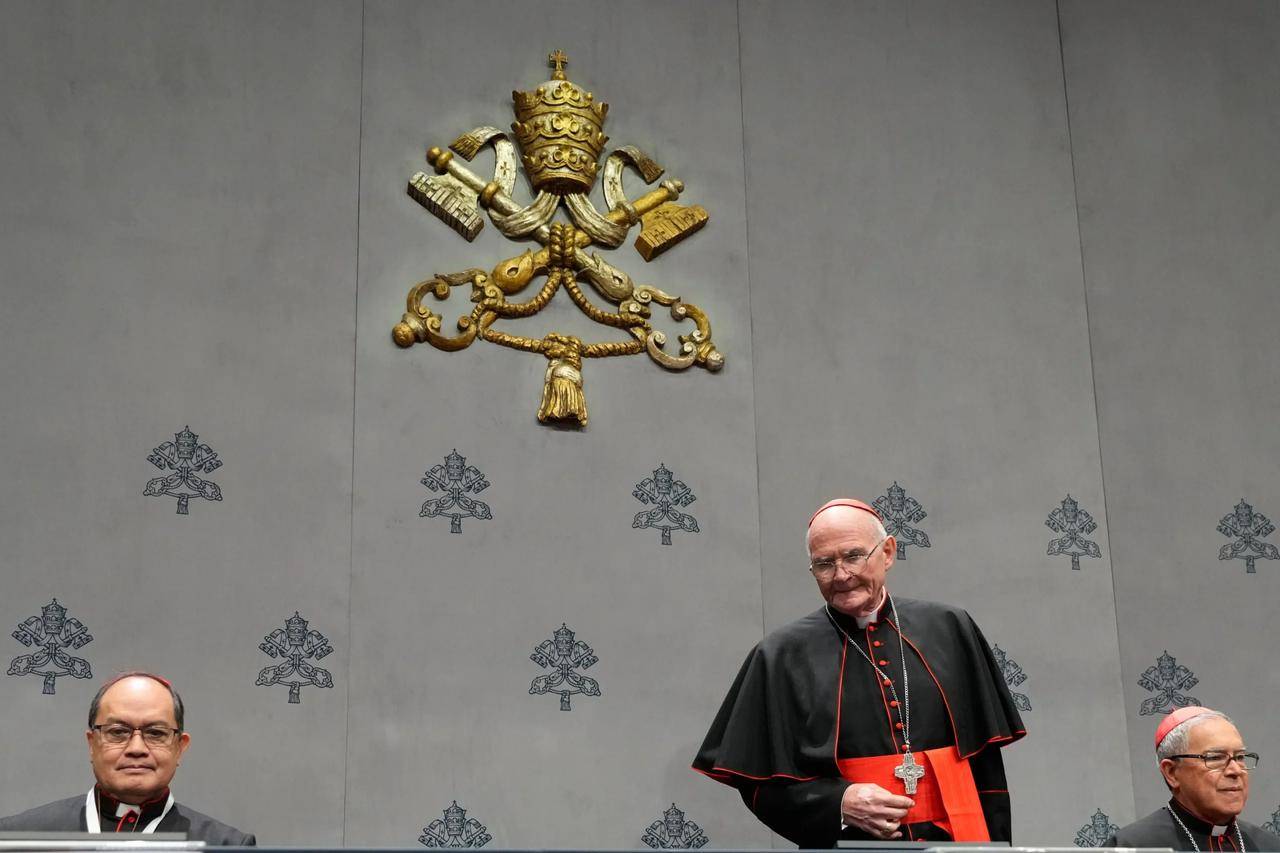ROME— Visiting the Southern Italian city of Bari, Pope Francis on Sunday demanded government leaders protect minorities, particularly Christians.
“The international community has been content with military interventions, whereas it should have built institutions that can guarantee equal opportunities and enable citizens to assume their responsibility for the common good,” Pope Francis said, speaking to bishops from countries around the Mediterranean Sea.
“The persecution experienced above all – but not only – by Christian communities is a heart-rending fact that cannot leave us indifferent,” he said. “In the meantime, we can never resign ourselves to the fact that someone who seeks hope by way of the sea can die without receiving help, or that someone from afar can fall prey to sexual exploitation, be underpaid or recruited by gangs.”
Francis remarks came as he was closing a Feb. 19-23 assembly of more than 50 Catholic bishops from 19 Mediterranean nations.
Addressing the pope, Cardinal Vinko Puljić, Archbishop of Sarajevo and president of the bishops’ conference of Bosnia-Herzegovina, said that during the days of work in Bari the prelates gathered sought ways to realize the possibility of mobility, equality, and religious freedom in the countries of the region.
“As shepherds, we have made ourselves the voice of the pain and suffering of our Churches and our peoples,” he said.
The north-eastern Mediterranean, at the end of the twentieth century, the cardinal noted, lived a “a winter of murders, destruction and persecution. But it’s not spring either for North Africa and the Middle East, where the Churches endure wounds and suffering, in the form of violence, conflicts and divisions of all kinds, caused largely by rich countries.”
Bari has become a center of ecumenism in Francis’s pontificate, since it holds the relics of St. Nicholas, who is venerated by both the Catholic and Orthodox Churches.
The encounter between the Catholic leaders and the pope took place in the Basilica of St. Nicholas.
Speaking off-the-cuff on Sunday, Francis called Bari the “city of unity, unity of the Church,” garnering applause.
At the heart of his speech were ecumenical dialogue, peace, immigration and the situation in the countries of the Mediterranean region, many currently threatened by outbreaks of instability and conflict, especially in the Middle East and Northern Africa.
The theme of the summit was “Mediterranean, peace frontier,” and the official program that included migration, the evangelization of young people, unemployment, cultural exchanges and peacemaking.
The pope said that the rhetoric of the clash of civilizations serves to justify violence and nurture hatred, and regretted that the failure and weakness of politics, together with factionalism, are leading to forms of radicalism and terrorism.
“To be sure, acceptance and a dignified integration are stages in a process that is not easy,” Francis said referring to migration. “Yet it is unthinkable that we can address the problem by putting up walls.”
Speaking about war, the pontiff lamented that “allocating resources to the acquisition of weapons and military power, diverts those resources from vital social needs, such as the support of families, health care and education.”
Quoting his predecessor St. John XXIII’s Pacem in Terris, issued in 1963, Francis said that this expenditure is “contrary to reason.” In fact, he said, “it’s genuine madness.”
“It is madness to destroy houses, bridges, factories and hospitals, to kill people and annihilate resources, instead of building human and economic relationships,” he said. “It is a kind of folly to which we cannot resign ourselves: War can never be considered normal, or accepted as an inevitable means of settling differences and conflicts of interest.”
Preaching the Gospel, the pope said, goes hand in hand with the common good and it should be an inspiration to act as peacemakers, before adding that the violence in the Middle East and Northern Africa threatens the Mediterranean. Francis also said that the “unresolved conflict between Israelis and Palestinians, with the danger of inequitable solutions and, hence, a prelude to new crises,” cannot be overlooked.
“There is no reasonable alternative to peace, because every attempt at exploitation or supremacy demeans both its author and its target,” Francis said. “It shows a myopic grasp of reality, since it can offer no future to either of the two. War is thus the failure of every plan, human and divine.”
To understand the damage of war, he said, it’s enough to visit a countryside or city that has been a theater of war: “A garden turns into a desolate and inhospitable landscape.”
Going off-the-cuff again, Francis spoke of the “grave sin of hypocrisy,” when at international conventions or meetings countries speak of peace but then sell weapons to countries that are at war.
“Peace, which the Church and every civic institution must always consider their first priority, has justice as its indispensable condition,” Francis said, adding that justice is trampled when economic interests prevail over the rights of individuals and communities.
“Justice is blocked by a throwaway culture that treats persons as if they were things, generating and promoting inequality,” he said, noting that at the shores of the Mediterranean there are nations of immense wealth and others where people struggle to survive.
The poor and most vulnerable, he said, must be respected by all those who preach the Gospel, because as the book of Corinthians says, “the parts of the body which seem to be weaker are indispensable” and “if one member suffers, all suffer together.”
He said that in the Mediterranean region, the poorest and most vulnerable include those who flee war, who left their homelands in search of a dignified life or abandoned their loved ones due to dramatic environmental and climatic conditions. The pope added that the governments and churches of both the countries that are a destination and that see their people leaving must not be found unprepared.
Francis also spoke of dialogue as a path towards peace, saying that there’s a need to develop a theology of acceptance and dialogue that leads to a “renewed understanding and proclamation of the teaching of Scripture.”
“This can only happen if we make every effort to take the first step and not exclude the seeds of truth also possessed by others,” he said. “In this way, the discussion of our various religious convictions can concern not only the truths we believe, but also specific themes that can become defining points of our teaching as a whole.”
The distorted notion that we are defending God by opposing those who don’t share our beliefs, Francis said, has too often throughout history been the basis for conflict.
“Indeed, extremism and fundamentalism deny the dignity of the human person and his or her religious freedom, and thus lead to moral decline and the spread of an antagonistic view of human relationships,” he said. “This too shows us the urgent need of a more vital encounter between different religious confessions, one motivated by sincere respect and a desire for peace.”
The pope repeated his frequent call for an ecumenism of action and solidarity rooted in the common good to combat a “throwaway culture,” an encounter between religious confessions that is rooted in peace.
Later in the day, Francis was scheduled to celebrate an open-air Mass in Bari’s city center and lead the faithful in the traditional Angelus prayer.
Follow Inés San Martín on Twitter: @inesanma
Crux is dedicated to smart, wired and independent reporting on the Vatican and worldwide Catholic Church. That kind of reporting doesn’t come cheap, and we need your support. You can help Crux by giving a small amount monthly, or with a onetime gift. Please remember, Crux is a for-profit organization, so contributions are not tax-deductible.











